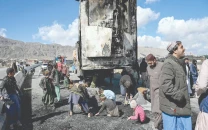City of flowers, no more

City of flowers, no more
The city has turned into a huge garbage bin with overflowing sewers and swarms of polythene bags that are an eyesore for the 3 million population of this city. A visit to different parts of the city, like the cantonment and smaller streets of the interior city reveal the true and tragic state of the sanitation situation.
The main bazaars of the city can be seen with garbage scattered everywhere and polythene bags flying around as one walks past. Dilapidated garbage bins overflowing with rubbish spread foul odors in every direction. Sewers choked with filth and polythene bags are common sights in most parts of the city. The authorities have so far failed to devise a mechanism to solve this serious sanitation problem which is only becoming worse with the increase in population in the city and surrounding areas.A large number of the city areas even lack these old and rusting garbage disposal bins and in such areas residents have turned the streets and vacant grounds into convenient make shift garbage dumps.
A street in the Gulberg locality of Peshawar Cantt is a case in point; the authorities dug up the street earlier this year to put in a new sewerage line, only a fraction of this work has been completed so far and parts of this street have been left with dug up holes that are a hazard to the residents of the street.
Tariq Ali, a resident of Gulberg said that this street was the main entry to the area and its condition is causing problems for the residents who had to now find an alternate route back home that goes through narrow winding streets. He asked the concerned authorities to complete such projects as quickly as possible.
The district government of Haji Ghaulam Ali in 2007 announced that they would purchase mechanical sweepers with an estimated cost of Rs. 36 million. This has never materialised due to reasons best known by the relevant authorities. Official figures say that city generates around 1,200 tonnes of garbage on a daily basis. The civic agencies in the city do not have the ability to properly dispose of even half of this quantity of waste and most of it is left to rot on the streets.
Town-I of the Peshawar district government comprises of the most thickly populated and urban areas of the capital. Interestingly, there are only 30 garbage bins in Town-I, and according to officials it needs at least 200 such garbage bins to meet the needs of the whole of town.
The situation in other parts is not difficult to predict. In March 2009, the Army Welfare Trust (AWT) arranged a briefing for the NWFP senior minister Bashir Ahmed Bilour about a waste recycling plant to improve the sanitation situation in the city. The facility was to be spread on 25 acres of land and would produce 90 percent fuel and fertilizer and 10 percent building material from garbage. AWT had to provide the equipment and vehicles worth Rs. 40 million to all four towns of the city, this too has not materialised.



















COMMENTS
Comments are moderated and generally will be posted if they are on-topic and not abusive.
For more information, please see our Comments FAQ